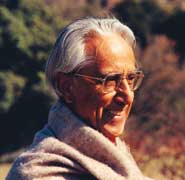




Dialogical dialogue or dialogal dialogue
“The dialogical-dialogue is not a simple conversation, not a mere mutual enrichment by the supplementary information that is contributed; it is not exclusively a corrective of misunderstandings … It is the joint search for the shared and the different. It is the mutual fecundation of what each one contributes …It is the implicit and explicit recognition that we are not self-sufficient … God is the one who makes it possible for dialogue to be more than the mere sterile crossing of two monologues. (“¿Mística comparada?”, en VVAA La mística en el siglo XXI, Madrid 2002).
The dialogical-dialogue or dialogal dialogue attempts to go beyond the dialectical dialogue in order to arrive at an authentic understanding of the other that allows for true mutual communication in the intent to forge a common language that knows how to traverse the limits of one’s own particular language. Panikkar wants to go beyond a mere dialogue that seeks to reach a certain mutual respect pact; he speaks of a dialogue opened to mutual enrichment. His thought and existential path have been a search for an ecumenical dialogue that implies approaching the other not only overcoming the temptation to conquer him, but also looking to open oneself to him without fearing the loss of one’s own positions and even with the conviction that those positions will find themselves enriched by what the other brings. This is because the diversity of the religions “participates in the beauty of reality which is not monochromatic”.
It is a matter of going beyond the level of the dialectic of ideas where competition dominates and victory belongs to the strongest, in order to arrive at an open welcoming dialogue where the otherness of communion may be brought into relief: to love one’s neighbor as one’s self means to love him as he is, as someone different and valuable, without trying to convert him to my ideas. Panikkar urges us, therefore, to go from attitudes of exclusivity to inclusiveness, moving toward a true pluralism: All the great religions are valid paths to the experience of the sacred, paths to the encounter with the Absolute, under its different forms. An inter-religious dialogue is not sufficient, we need to achieve an intra-religious dialogue; an ecumenical ecumenism (cf. later discussion) that leads to a dialogue at the very heart of our religious life, a dialogue which each of us as a believer must realize in the interior of our own experiences in order to open ourselves to the experience of others. It means achieving genuine religious interpenetration, a mutual influencing of the different religions in order to reach authentic pluralism, which is actively opposed to any monopoly whether cultural or religious.
This pluralism is the opposite of the old temptation of syncretism since the latter attempts to eliminate those differences that enrich the religions. “Syncretism is disorienting and leads nowhere … It is said that all roads lead to Rome. But there are two ways to never arrive: if we stop along the way on any of the roads or if we go along jumping from one road to another … Religion is a road, a life, a global attitude of Man who is faced with the mystery, with the meaning that his life and existence in general may have” (“Las religiones”, La Vanguardia, Barcelona 12-I-1995).
official site